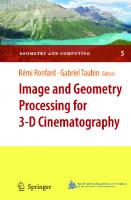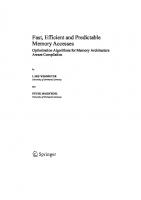An Architecture Extension for Efficient Geometry Processing
Retrieved from http://web.archive.org/web/20050817082916/http://www.hotchips.org/archives/hc11/3_Tue/hc99.s8.1.Thekkath.
369 102 187KB
English Pages 23 Year 1999
Recommend Papers

- Author / Uploaded
- Radhika Thekkath
- Mike Uhler
- Chandlee Harrell
- Ying-wai Ho
- Similar Topics
- Technique
- Electronics: Microprocessor Technology
File loading please wait...
Citation preview
An Architecture Extension for Efficient Geometry Processing Radhika Thekkath, Mike Uhler, Chandlee Harrell, Ying-wai Ho MIPS Technologies, Inc. 1225 Charleston Road Mountain View, CA 94043
Talk Outline l
l
l l l
Motivation---why enhance the MIPS architecture Background on 3D graphics geometry operations and current MIPS architecture What are the enhancements? Performance and cost Summary
An Architecture Extension for Efficient Geometry Processing
2
Current 3D Rendering Limited by Geometry Processing l
Front-end Geometry and Lighting operations u
l
Back-end : Rendering u
l
General-purpose processors: 0.5 - 2 M polygons/s. Eg. R5K (1998,200MHz), PIII (1999,500MHz). Graphics processors: 6 - 8 M polygons/s. Eg. ATI Rage 128(1999), 3Dfx Voodoo3(1999).
A solution: dedicated hardware --- highperformance, but expensive. Eg. Sony Emotion Engine An Architecture Extension for Efficient Geometry Processing
3
Our Solution l
l l
Enhance the MIPS architecture to improve 3D geometry performance : MIPS-3D™ ASE (Application Specific Extension) includes 13 new instructions Lower cost than dedicated geometry hardware Main processor improvements are leveraged u u
technology/speed parallelism/pipelining
An Architecture Extension for Efficient Geometry Processing
4
Talk Outline l
l
l l l
Motivation---why enhance the MIPS architecture Background on 3D graphics geometry operations and current MIPS architecture What are the enhancements? Performance and cost Summary
An Architecture Extension for Efficient Geometry Processing
5
Geometry and Lighting Operations l l l
l
Vertex transformation (matrix multiplication) Clip-check (compare and branch) Transform to screen coordinates (perspective division using reciprocal) Lighting : infinite and local (normalization using reciprocal square root)
An Architecture Extension for Efficient Geometry Processing
6
Already in the MIPS Architecture S - Single FP format (32 bits) D - Double FP format (64 bits) PS- Paired-Single, two singles
l
Floating point operations u u u
S
S u
64 bits
u
MUL (S, D, PS) ADD (S, D, PS) MADD (S, D, PS) (multiply-add) RECIP (S, D) RSQRT (S, D)
An Architecture Extension for Efficient Geometry Processing
7
Talk Outline l
l
l l l
Motivation---why enhance the MIPS architecture Background on 3D graphics geometry operations and current MIPS architecture What are the enhancements? Performance and cost Summary
An Architecture Extension for Efficient Geometry Processing
8
ADDR: for Vertex Transformation m0 xyzw * m1 m2 m3
m4 m5 m6 m7
m8 m9 m10 m11
m12 = xt yt zt wt m13 m14 Eg. xt = m0x + m1y + m2z + m3w m15 FP0 = [m1 | m0]
*
FP8 = [ y | x ]
FP1 = [m3 | m2]
*
FP9 = [ w | z ]
FP10 = [m1y | m0x] + [m3w | m2z] MUL.PS FP10, FP0, FP8 MADD.PS FP11, FP10, FP1, FP9 FP11 = [m1y+m3w | m0x+m2z] Reorganize register to enable add ADDR ADD.PS ... ADDR.PS FP11, FP?, FP11
FP11 = [-- | m1y+m3w+m0x+m2z]
An Architecture Extension for Efficient Geometry Processing
9
Clip Check (Compare) Is the vertex within the viewing pyramid?
x >= -w, x = -w, y = -w, z









